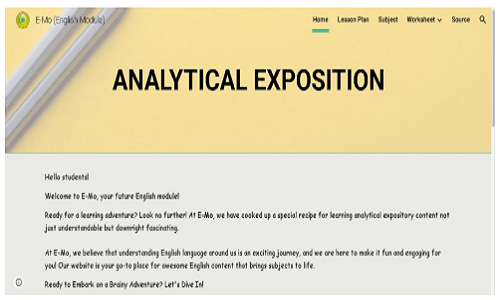
Development of E-module through Google Site to Improve Students’ Grammar Ability
Abstract
Keywords
Full Text:
PDFReferences
Afinda, B. N., Anwar, S., & Sumarna, O. (2023). Analysis of The Need for Applied Science Teaching Materials in Chemical Materials in Vocational School, Department of Culinary, Tangerang District. Journal of Education and Learning Research, 1(1), 30-36.
Afroz, R., Ramlan, S. S. A. A., Anny, N. Z., & Afroz, M. N. I. (2024). Using Continuing Professional Development (CPD) for Enhancing Teaching Quality in Higher Education of Bangladesh. Journal of Education and Learning Research, 2(1), 1-15.
Almelhi, A. M. (2021). Effectiveness of the ADDIE Model within an E-Learning Environment in Developing Creative Writing in EFL Students. English Language Teaching, 14(2), 20. https://doi.org/10.5539/elt.v14n2p20
Alsaleh, N. (2020). The effectiveness of an Instructional Design Training Program to Enhance Teachers’ Perceived Skills in Solving Educational Problems. Academic Journal, 15(12), 751–763. https://doi.org/10.5897/ERR2020.4082
Aufa, V. T., Febtiningsih, P., & Syahfutra, W. (2023). The Development of Web-Based English Learning Media to Improve The Quality of English-Speaking Skill. 1–15.
Bayram, S. (2021). Assessment of Student Scores Based on Specific Variables in the Web-Assisted English Grammar Exercises. World Journal on Educational Technology: Current Issues, 13(4), 205–219.
Citra, D. R., Supriadi, S., & Hardini, F. (2022). Using Video on Youtube To Improve Students’ Grammar Ability. Journal of Language, Literature, and Teaching, 4(2), 77–90. https://doi.org/10.35529/jllte.v4i2.77-90
Curtin, D. (2021). A Descriptive Grammar of english Modern English Grammar by Example Andrew Rossiter. English Australia Journal, 37(1), 107–110.
Ekinci Çelikpazu, E., & Taşdemir, F. (2022). Grammar Anxiety Scale: The Validity and Reliability Study. Participatory Educational Research, 9(4), 343–366. https://doi.org/10.17275/per.22.94.9.4
Enesi, M., Strati, E., & Trifoni, A. (2023). Alternative Grammar Teaching vs. Traditional Grammar Teaching in Albanian Tertiary Education. International Journal of Education and Practice, 11(2), 279–294. https://doi.org/10.18488/61.v11i2.3337
ER, O., & Saritiken, H. (2022). Perceptions of Middle School Turkish Language Teachers on Using e-Learning Tools in Grammar Teaching. International Journal of Education and Literacy Studies, 10(4), 9–18. https://doi.org/10.7575/aiac.ijels.v.10n.4p.9
Feng, J., & Sangsawang, T. (2023). Information Technology, According to the ADDIE Model on English Subject Teaching, Enhances the Learning Achievement of Shunde Polytechnic Students in China . TOJET: The Turkish Online Journal of Educational Technology, 22(4), 121–131.
Hakim, L. A., Pahmi, P., & Febtiningsih, P. (2023). The Development of Read Riddle Games to Improve Students’ Reading Interest. ELT-Lectura, 10(2), 177–187. https://doi.org/10.31849/elt-lectura.v10i2.14813
Handayani, N. D., & Ambalegin, A. (2023). Google Form Application Effect on Students’ Basic English Grammar Mastery. ELP (Journal of English Language Pedagogy), 8(1), 88–105. https://doi.org/10.36665/elp.v8i1.735
Hasan, D. (2022). The Use Of The Grammarly Application To Improve Students’ Grammar Mastery At Sman 18 Makassar. Bosowa University.
Jeah M. B. (2022). Journal of Technology and Science Education. Journal of Technology and Science Education, 4(4), 215–227. http://www.jotse.org/index.php/jotse/article/view/110/142
Jusriati, J., Kurniadi, W., Azizah, A., & Nawawi, N. (2023). Google Site-Based Interactive Electronic Module as Basic Writing Media. Ethical Lingua: Journal of Language Teaching and Literature, 10(2), 478–488. https://doi.org/10.30605/25409190.633
Kayan, A., & Aydın, İ. S. (2020). The Effect of Computer-Assisted Educational Games on Teaching Grammar. World Journal of Education, 10(1), 117. https://doi.org/10.5430/wje.v10n1p117
Kayar, A., & Veyis, F. (2020). An Analysis of Grammar Teaching in Secondary School in Terms of Success, Attitude and Teachers ’Views. Asian Journal of Education and Training, 6(2), 149–160. https://doi.org/10.20448/journal.522.2020.62.149.160
Koç, G., & Sütçü, S. S. (2023). The Impact of Gamification on Secondary School Students’ Grammar Proficiency. Educational Policy Analysis and Strategic Research, 18(1), 31–49. https://doi.org/10.29329/epasr.2023.525.2
Kunto, A. (2019). Prosedur Penelitian Suatu Pendekatan Praktik.
Munawaroh, N., & Sholikhah, N. (2022). Pengembangan LKPD Berbasis Problem Based Learning Melalui Video Interaktif Berbantuan Google Site Untuk Menstimulasi Kemampuan Berpikir Kritis. Jurnal Ecogen, 5(2), 167. https://doi.org/10.24036/jmpe.v5i2.12860
Nugraheni, F. (2017). Teachers’ Techniques for Developing Students’ Grammatical Ability at Eleventh’ Grade of SMA N 1 Cepogo.
Nurhayati, D. A. W. (2019). Learning Basic Grammar using Task-Based Learning: A Perspective on Analyzing Online Media Text. IJELTAL (Indonesian Journal of English Language Teaching and Applied Linguistics), 4(1), 19. https://doi.org/10.21093/ijeltal.v4i1.284
Oktalia, D., & Drajati, N. A. (2018). English Teachers’ Perceptions of Text to Speech Software and Google site in an EFL Classroom: What English Teachers Really Think and Know. International Journal of Education and Development using Information and Communication Technology (IJEDICT), 14(5), 183–192.
Rahmawati, D., Vahlia, I., Mustika, M., Yunarti, T., & Nurhanurawati, N. (2022). Validity Analysis of Development of Socrates-Based Linear Aljebra E-Modules. Education Quarterly Reviews, 5(2). https://doi.org/10.31014/aior.1993.05.02.495
Songkhro, J., Dequiña, Jr., L. S., Dominguez, R. R., & Phanlapa Khathayut, P. (2022). Effectiveness of using Animated Videos via Google Sites in Enhancing Socio-culture of Native English-Speaking Countries. Education Quarterly Reviews, 5(2). https://doi.org/10.31014/aior.1993.05.02.497
Souisa, T. R., & Yanuarius, L. (2020). Teachers’ Strategies on Teaching Grammar: Facts and Expectations Of Senior High School Teachers at Ambon. International Journal of Evaluation and Research in Education, 9(4), 1121–1127. https://doi.org/10.11591/ijere.v9i4.20643
Spatioti, A., Kazanidis, I., & Pange, J. (2023). Educational Design and Evaluation Models of the Learning Effectiveness in E-Learning Process: a Systematic Review. Turkish Online Journal of Distance Education, 24(4), 318–347. https://doi.org/10.17718/tojde.1177297
Stephens, & Sanderson, I. J. (2021). Two Tenses: An Alternative to Teaching English Grammar Tense. Thaitesol Journal, 34(1), 25–44.
Sugiyono, D. (2017). Metode Penelitian Kuantitatif, Kualitatif, dan Tindakan.
Winarni, E. W. (2018). Teori Dan Praktik Penelitian Kuantitatif Kualitatif Penelitian Tindakan Kelas, Research And Development. Bumi Aksara.
DOI: http://dx.doi.org/10.31258/jes.8.3.p.379-391
Refbacks
- There are currently no refbacks.
Copyright (c) 2024 Sajid Wijdan Majri

This work is licensed under a Creative Commons Attribution 4.0 International License.
Publisher: FKIP Universitas Riau












